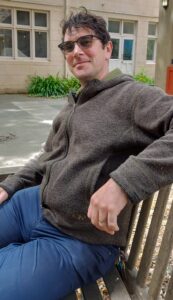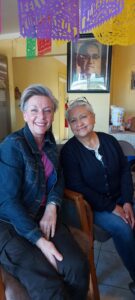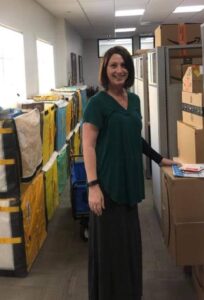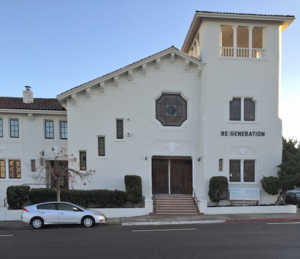SAN FRANCISCO (OAKLAND)
ORGANISATIONS
I visited five organisations in the Oakland/San Francisco Bay area. In addition to my primary focus of exploring how they utilise volunteers from host or disadvantaged working class communities, I was keen to see how they adapted to delivering services in what is a very ‘hostile environment’ for refugees.
East Bay Sanctuary Covenant

Founded on 24 March 1982 in response to civil wars in Central America, individuals from five San Francisco Bay Area church congregations, along with one in Arizona, despite the risk of arrest and imprisonment, publicly declared their commitment to providing sanctuary for the 60,000 Salvadoran and Guatemalan refugees fleeing violence and persecution from their own governments.
By 1986, the East Bay Sanctuary Covenant (EBSC)had expanded to a 31-member organisation with a mission to “protect, support, and advocate” on behalf of Central American refugees, to end military aid to the Salvadoran and Guatemalan governments, and to educate the public about the reasons the refugees were seeking safe haven. EBSC maintained a dual focus of responding to the needs of recently arrived refugees and supporting and protecting the rights of individuals persecuted in these countries.
For many church congregations, the declaration of sanctuary was a symbolic act. Congregations provided refugees with housing, direct services, and employment. Staff, volunteers, and community members formed “circles of refuge” to raise bond money to release refugees from detention and to educate the wider public about their plight.
To date, EBSC has assisted over 4,000 people in achieving asylum, boasting a 98% success rate.
EBSC’s main focus remains on legal assistance, but it continually strives to maintain its grassroots connections with the local communities it represents, relying heavily on volunteers from these groups. They are committed to supporting clients more holistically, offering support with housing, health, benefits, job searching, etc., thereby offering volunteers a wide array of varied roles.
Lisa Hoffman – CEO East Bay Sanctuary:
“They (the Federal Government) provide over half our budget, primarily for legal services but they are aware that unaccompanied minors have unique needs, and have been hearing from people like us for many years that we need more, more wrap-around integrated services. We’re the first place people come, the first place they tell their story and they have trust with us. They’re often traumatised, don’t speak English, for people who do speak English our systems are difficult to navigate so they don’t, so our team helps them to access those services and has a critical role to play as part of the bridge. We can’t do everything, we know that.
We began to reach out to people from the community the ‘primatores’ and trained them, sent them out to the flea market, the churches and the schools to make that bridge. People couldn’t come here so we went to where they gather, offering information, offering support. We were then able to get some funding for that project. Its been exciting to see this model grow.”
Whilst visiting the project, I met Jessica, one of the volunteers who had started volunteering with EBSC on 23rd January 2023:

Jessica Mendez – Translation Volunteer at East Bay Sanctuary Covenant
Jessica, the daughter of two undocumented Mexican migrants, started volunteering at EBSC in late January 2023. Now a US citizen herself, she dedicates roughly six hours of her time each week to translating for Spanish-speaking migrants.
“I have a passion for working with undocumented migrants who look like me,” she told me as we sat down to chat.
In the long term, Jessica would like to become a lawyer, pursuing a career in refugee advocacy with a focus on representing refugee children who are held in detention centres.
What impact does volunteering have on you?
“It gives me hope knowing there are so many people willing to help.”
Owen Thompson Lastad, Support Services Manager for East Bay Sanctuary
 I also met Owen Thompson Lastad, the Support Services Manager for EBSC.
I also met Owen Thompson Lastad, the Support Services Manager for EBSC.
Owen has worked in this role at East Bay for the past 16 months. He has focused on supporting clients more holistically, providing assistance with housing, health, benefits, job searching, etc., heavily relying on local volunteers to support these programmes.
“A lot of our volunteers are second-generation individuals who come from disadvantaged backgrounds; they grew up poor, belonging to the working class, with parents who did not have a formal education.”
I asked if he had noticed a difference between these volunteers and those from more middle-class, affluent backgrounds.
“We have to work on building confidence in volunteers from disadvantaged backgrounds – they are capable of the tasks at hand, but they don’t always believe they are. They tend to suffer from impostor syndrome and don’t feel that they are welcome.
When it comes to their ability to do what we need them to do, the capability is always there. Really, the most important factor for us is that volunteers are empathetic because the clients they are going to work with are extremely stressed out. Sometimes, we can’t offer direct assistance, right? But, to me, a vital aspect of our service is empathetically listening to people, affirming their experiences. This is something we can always offer, whether or not we can help them find housing.
It’s about treating people respectfully, which they don’t always experience from the government or non-profits. Unfortunately, there is a lot of giving people the runaround, and often individuals are sent from one place to another because others don’t want to take the time to figure out the best way to assist them.”
I was interested to know what he believed, based on his experience, were the advantages of having volunteers from disadvantaged communities. He listed the following:
- Empathetic: Volunteers from similar backgrounds tend to have more empathy
- Comfort: Clients feel more comfortable interacting with volunteers from similar backgrounds, feeling a sense of affinity.
- Relatability: Clients perceive the interaction as ‘someone like me helping me’ rather than ‘someone from a higher socio-economic class reaching down to help me’
- Trust: It is easier to build trust with clients.
1951 Coffee Company
 1951 Coffee Company, founded in 2015, is a non-profit speciality coffee organisation that promotes the well-being of the refugee community in the United States by providing job training and employment to refugees, asylees, and special immigrant visa holders whilst seeking to educate the surrounding community about refugee life and issues.
1951 Coffee Company, founded in 2015, is a non-profit speciality coffee organisation that promotes the well-being of the refugee community in the United States by providing job training and employment to refugees, asylees, and special immigrant visa holders whilst seeking to educate the surrounding community about refugee life and issues.
Their name is derived from the United Nations High Commissioner for Refugees 1951 Refugee Convention, which first defined and set forth guidelines for the protection of refugees. In the spirit of this convention, 1951 Coffee works with refugees to help them overcome the unique barriers they face in seeking and sustaining employment.
I met with Doug Hewitt, one of the founders of the company.
He shared his story of coming from a working-class, blue-collar town in East Tennessee: socially conservative and 98% white. By the time he was in high school, people from Central America had started moving in. Met with suspicion at first, over time, respect built up because of the hard-working nature of the people coming from Central America and the hard-working nature of the blue-collar communities.
“I.C.E. (Immigration Control and Enforcement) started to do a lot to target those communities and expel people.”
It was the first time Doug saw people from his hometown upset about individuals being removed from the country. Suddenly their friends, their co-workers, their neighbours were missing, and for Doug, that’s when he realised that working alongside people, being in a community alongside people, completely changes a narrative.
“When it’s ‘far away’, when it’s refugee resettlement ‘over there’, it’s very easy to demonise, but when you’re working alongside, it’s very, very different.”
He was working in a coffee shop himself when he met a colleague who was an asylum seeker from Eritrea. Through that, he got connected with the Eritrean community there, and after a while, started volunteering with the International Rescue Committee (IRC) as a family mentor. He applied a couple of times to work with the IRC and finally got a job with them working in refugee employment.
This whole experience gave Doug what he terms as a ‘deep dive’ into the US refugee resettlement system, as funded by the US Government. “I came to a point where I needed to step out of the government system because I was getting really frustrated by it and was probably going to get burned out. I needed to find a way to make this process better.”
Having worked in employment and in coffee, he knew there was an opportunity here to help people connect with better ‘first jobs’, and as the ‘cafe’ is, in Doug’s words, very much a hub of activity in American life, he saw it as also providing opportunities for integration.
And so, in 2015, he and another coworker left the IRC and started 1951 Coffee Company. Since its start, 1951 Coffee has employed 62 people from refugee backgrounds. They have also built up a network of around 40 partner coffee companies in the Bay Area that will hire people graduating from 1951’s training programme. 340 refugees have been trained at this point.
Oakland Catholic Worker
 Located in the heart of Oakland’s immigrant and refugee community, the Oakland Catholic Worker provides transitional shelter and comprehensive support services for undocumented immigrant families on their path to self-sufficiency. They help to support them with referrals to social service/legal assistance, medical/psychological help, education, basic literacy, women’s leadership groups, and job training and placement. In addition to these services, they provide ESL classes, food programmes and religious and cultural activities throughout the year. Staff and guests also advocate together for justice for the immigrant community.
Located in the heart of Oakland’s immigrant and refugee community, the Oakland Catholic Worker provides transitional shelter and comprehensive support services for undocumented immigrant families on their path to self-sufficiency. They help to support them with referrals to social service/legal assistance, medical/psychological help, education, basic literacy, women’s leadership groups, and job training and placement. In addition to these services, they provide ESL classes, food programmes and religious and cultural activities throughout the year. Staff and guests also advocate together for justice for the immigrant community.
Services are provided by a small staff team and a larger team of volunteers from the local community.
I arrived here in the middle of a ‘despedida’, a farewell party for one resident who was moving into his own accommodation after spending a couple of years living in the centre.
The warmth and inclusion of the people who welcomed me I shall never forget.
People who literally had nothing sat me down and gave me food to eat – in the brief time I spent there, I wanted to live there. The staff lived in and everything was shared.
Martha
 I met a wonderful volunteer, Martha, who has volunteered at the centre for around 30 years. She came to the USA in 1977 from Mexico.
I met a wonderful volunteer, Martha, who has volunteered at the centre for around 30 years. She came to the USA in 1977 from Mexico.
“I started volunteering decades ago! Ever since I started school, I began volunteering; I volunteered at school, I volunteered in the church, everywhere I went. But here, actually, I live around the corner, and when we moved here, they gave us food like bread, beans and stuff like that, so I knew about this place. So now I’m retired, I volunteer; I started helping in the food line. I love helping there; it’s mainly seniors and families with children. Food is so expensive, and families need help.”
Does it help that you’re from the same community?
“Oh, it helps – I like the fellowship; when I come here, I feel like a person. At home, I’m by myself; I eat alone; here, it’s a family. You feel needed; you feel like you can do something. You can have the worst day and come here, and you’re OK.”
Faith
Faith, one of the workers there, explained to me the importance of using volunteers from the same community:
“Amongst the Latin community there is a concept called ‘confianza’ – it’s a sort of trust and faith, from people whom you know have your trust. It becomes a network of ‘confianza’, and when someone meets a new person from that network, they’ll say ‘oh, this person is ‘confianza’!’ That level already exists within the same community.”
Jewish Family & Children Services:

Jewish Family & Children’s Services (JFCS) is a non-profit organisation based in Oakland, California. It has a long history of providing essential social services to both the Jewish community and the broader community in the San Francisco Bay Area. Historically associated with the Jewish community, JFCS has expanded its services to cater to a more inclusive client base.
It now operates several programmes that serve people from diverse backgrounds and runs a large Refugee and Immigrant program. This program assists refugees and immigrants with resettlement services, legal assistance, language instruction, vocational training, and cultural orientation.
I met with Ami Dodson, the Volunteer Services Manager, and Zoe Pollock, the Program Coordinator of Community Teams, to learn about their approaches in this area.
They demonstrated a profound understanding of some of the challenges faced by working-class communities and had devised strategies to address these issues effectively.
I began by asking Ami whether they recruit volunteers from the areas where refugees are settled. She responded, “Yes, absolutely. We offer between 12 and 15 different volunteer programs, one of which is the ‘Community Welcome Team Program’. It’s really difficult because the people who have time to volunteer are generally more affluent, but we strive to avoid the ‘saviour syndrome’, where affluent individuals attempt to ‘rescue’ poorer, predominantly [racial and ethnic minority groups] communities. Zoe, our Community Welcome Teams Coordinator, has developed a comprehensive training module on avoiding ‘saviour syndrome’. To diversify our volunteer base, we have partnered with various community places of worship including churches, mosques, and temples. Our ultimate goal is for our volunteer pool to reflect the demographics of the clients we serve.”
Zoe Pollock, the Program Coordinator for Community Teams, added, “I’m always happy to discuss the Community Welcome Teams! Typically, a team consists of 4 to 8 people, although some teams are slightly larger. It’s up to the volunteers to recruit their own teams before approaching us. These volunteers often become the first ‘neighbours’ a client will meet. The areas of focus vary greatly, largely depending on the clients themselves. Volunteers assist with a range of tasks including:
- Transportation: it’s really difficult to get around here. Volunteers with cars offer lifts, while others help clients navigate the public transport system.
- Grocery shopping: helping clients learn how to use their food stamps.
- School registration: although case managers can complete some parts online, it’s beneficial to have a volunteer accompany a client to the administration office to advocate for them, as clients may not know what questions to ask.
- English language learning: this could be through structured one-on-one sessions or informal groups.
- Community connection: helping clients connect to community activities and services available in their locality.
- Translation coaching.
- Befriending: fostering friendships and social connections to help clients settle in.
Recruiting volunteers is always more straightforward when there is an institutional connection, such as a faith-based community.”
Regeneration Church:

Located in the heart of downtown Oakland, Regeneration Church serves the local community through a range of social programmes.
After completing a church Bible study on ‘Welcoming the Stranger’ in 2014, Kristen Law, a local member of the congregation, approached Refugee Transitions to help initiate a Citizenship and ESOL class in the church’s cafe on Saturday mornings. Refugee Transitions trained Kristen to conduct the classes, and she has facilitated them every week for the past nine years. An additional 15 local volunteers have assisted in delivering these classes during that period, serving over 100 refugees. When I asked Kristen where the refugees came from, she replied:
“We serve refugees and new immigrants, including undocumented individuals, so we are open to all adults wanting to prepare for the citizenship exam or learn English. For refugees, the largest group has come from Burma, followed by a significant number from Bhutan; there are smaller numbers from countries like Eritrea, Ethiopia, Guatemala, Venezuela, Mexico, Sri Lanka, Iran, Yemen, Turkey, Afghanistan, and Bangladesh. Non-refugees hail from nations including China, Taiwan, the Dominican Republic, Cambodia, Vietnam, and Mongolia. I’m sure I have missed some countries.”
However, their work extends far beyond language instruction. Kristen recounted the various other life activities she and the volunteers have assisted their students with:
“We’ve helped refugees with medical needs and located a foster program offering free orthodontic services for braces. We’ve assisted refugees in finding housing and resolving housing issues with landlords. We’ve supported those seeking employment, including helping with CV preparation. We’ve managed to find used household items like mattresses, dressers, TVs, bunk beds, tables, etc.
We’ve taken students on field trips to acquaint them with their new home, including trips to grocery stores/drugstores to practise finding specific products, visits to the local library to arrange library cards, and walks around Lake Merritt after class. We’ve also organised numerous parties for Christmas and Thanksgiving.”
In essence, they offer an incredibly diverse service, providing a range of volunteering opportunities-a facet that was beginning to emerge as critically important when aiming to involve volunteers from more disadvantaged communities.
LOOKING BACK
Before I set off for USA, I had wondered if social class would translate along the clearer lines that it does here in the UK. I found the organisations I spent time with not only had a clear understanding of working class-communities, but also recognised the importance and benefits of including people from them. They had taken time to understand the barriers working class communities commonly faced and had adopted ways of working which brought equity with their middle class counterparts.
I was greatly impacted by the resilience of the Latin American people. They had overcome the many trials and tribulations which had stood in their way. Their humility and kindness moved me to tears. It was truly an honour to spend so much time with them.
The determination and strength of the people who worked in the organisations I visited was overwhelmingly inspiring. We face similar rough waters here in the UK, but it was as though our American counterparts had gone before and had chartered a way through. We use the phrase ‘when America sneezes, Britain catches a cold’ but here they seemed to have discovered a dose of medicine and I hope to bring some of that back with me.
![]()
The views and opinions expressed in this report and its content are those of the author and not of the Churchill Fellowship or its partners, which have no responsibility or liability for any part of the report. All images are the author’s own unless otherwise stated.

